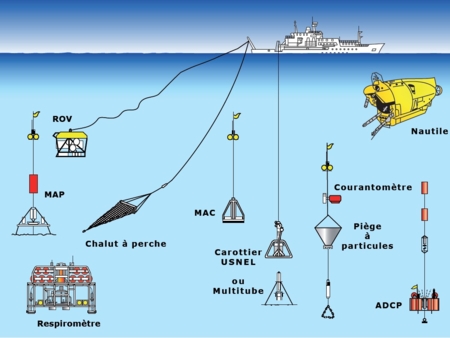Study of the gut epibiont diversity of the hydrothermal shrimp Rimicaris exoculata : a possible mutualistic association
In the deep-sea hydrothermal vents ecosystems, the driving energy comes from the microbial chemosynthesis. Symbioses between invertebrates and micro-organisms are common. They could be associations such as parasitism, commensalism or mutualism or even obligate symbioses and they could play distinct roles. The caridean shrimp Rimicaris exoculata is an endemic species of the Mid-Atlantic Ridge (MAR) hydrothermal sites. It is the main specie of the megafauna of some MAR sites. This crustacean harbors two microbial colonization regions, in the gill chamber and in the gut, but their roles are still unknown. Using various approaches, this work showed that there were distinct microbial communities among which a part would be resident and specific to R. Exoculata. This community is composed of Deferribacteres, Mollicutes and Epsilonproteobacteria. The microscopic approaches revealed the dominance of a single filamentous morphotype closely associated with the gut epithelium. Its settlement and growth seemed to be managed by the host. The molecular approaches showed that: (1) the Rainbow site epibionts harbored a phylogenetic particularity suggesting an ancient evolutionnary history whereas the Logatchev and Ashadzé seemed to have been colonized more recently by the association host-epibionts, (2) the epibionts, not retrieved in the surrounding environment and clustering i a monophyletic group along the MAR, could be vertically-transmitted, and (3) the association between R. Exoculata and the epibionts could be mutualistic and obligate. So, this research study gave the bases to understand the R. Exoculata symbiotic model.







